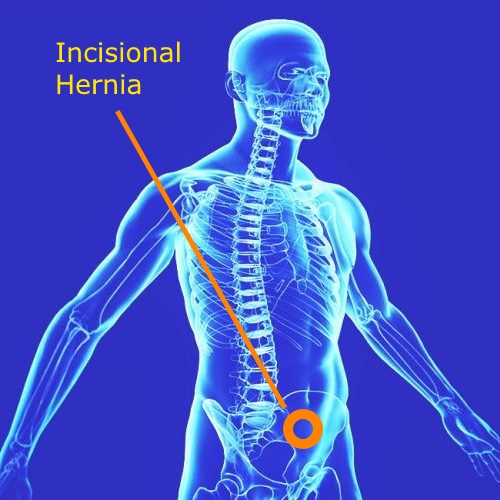HOME > HERNIA TYPES > INCISIONAL HERNIA

An incisional hernia is a protrusion of abdominal contents through a previously made incision in the abdominal wall that has failed to heal properly and has come apart. The incision would have initially been made during abdominal surgery, for instance bowel surgery. Very rarely the hernia contents (the intestine) get trapped and lose their blood supply, requiring emergency surgery. This is known as a strangulated hernia and can be very dangerous. The best course of action is to seek immediate treatment; otherwise the hernia will almost certainly get bigger and probably become more and more unsightly and uncomfortable.
An incisional hernia is caused through a previously made incision in the abdominal wall such as a scar left from a previous surgical operation. The incision could have initially been made during surgery when trying to reach internal organs such as the appendix. After the conclusion of the operation the surgeon will close the layers of the abdominal wall with stitches. If the closure fails to heal properly or the stitches come apart over time, this can cause the hernia.
The main feature of an Incisional Hernia is a bulge under the skin, close to or beneath the incision scar. In many cases hernias are either painless or produce an occasional ‘ache’ after activity, but sometimes the discomfort can be quite marked.
The two standard methods of repair would be either an open technique or laparoscopic surgery. Deciding which one depends on the hernia, the desired outcome, a balance of risks and benefits, the patient and the surgeon. The type of repair is always tailored to the patient’s case.
At London Hernia we offer rapid access/turnaround from consultation to surgery. With a wealth of talented surgeons and available theatre slots we can work around your schedule and ensure you’re back to health as soon as possible. For the next available surgery slot we recommend contacting our specialist team.
Incisional hernias almost inevitably enlarge with time, and if feasible should be repaired sooner rather than later. Even though many hernias do not hurt and the temptation may be to leave them and get on with life, the recommended option is always to seek treatment before the problem worsens. As they enlarge repair becomes more difficult for the surgeon, more hazardous for the patient, and the chances of failure increase.
To ask a question or book an appointment you can contact our team by calling (+351) 22 20 62 100 or by emailing us at info@portoherniaclinic.com.